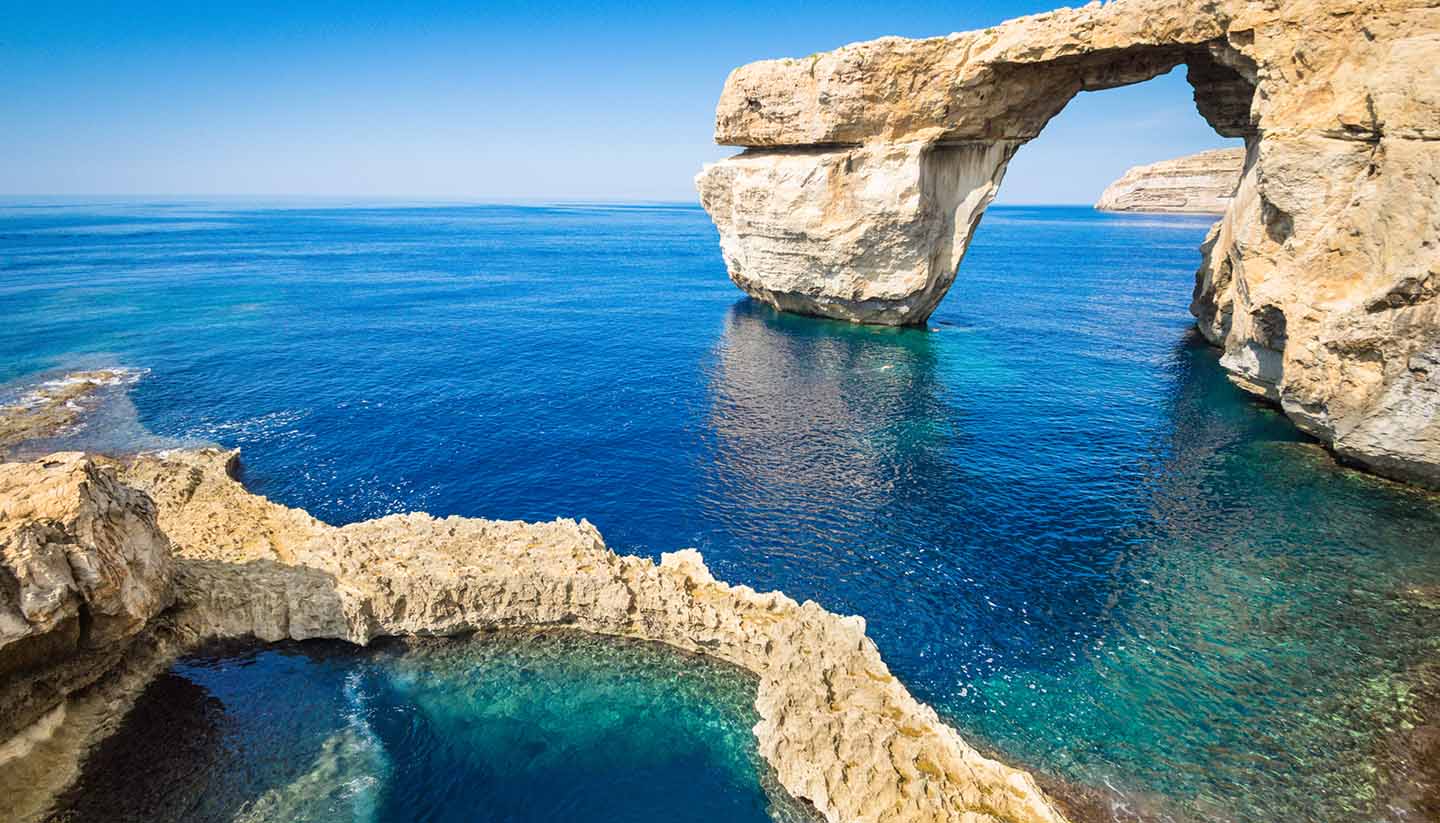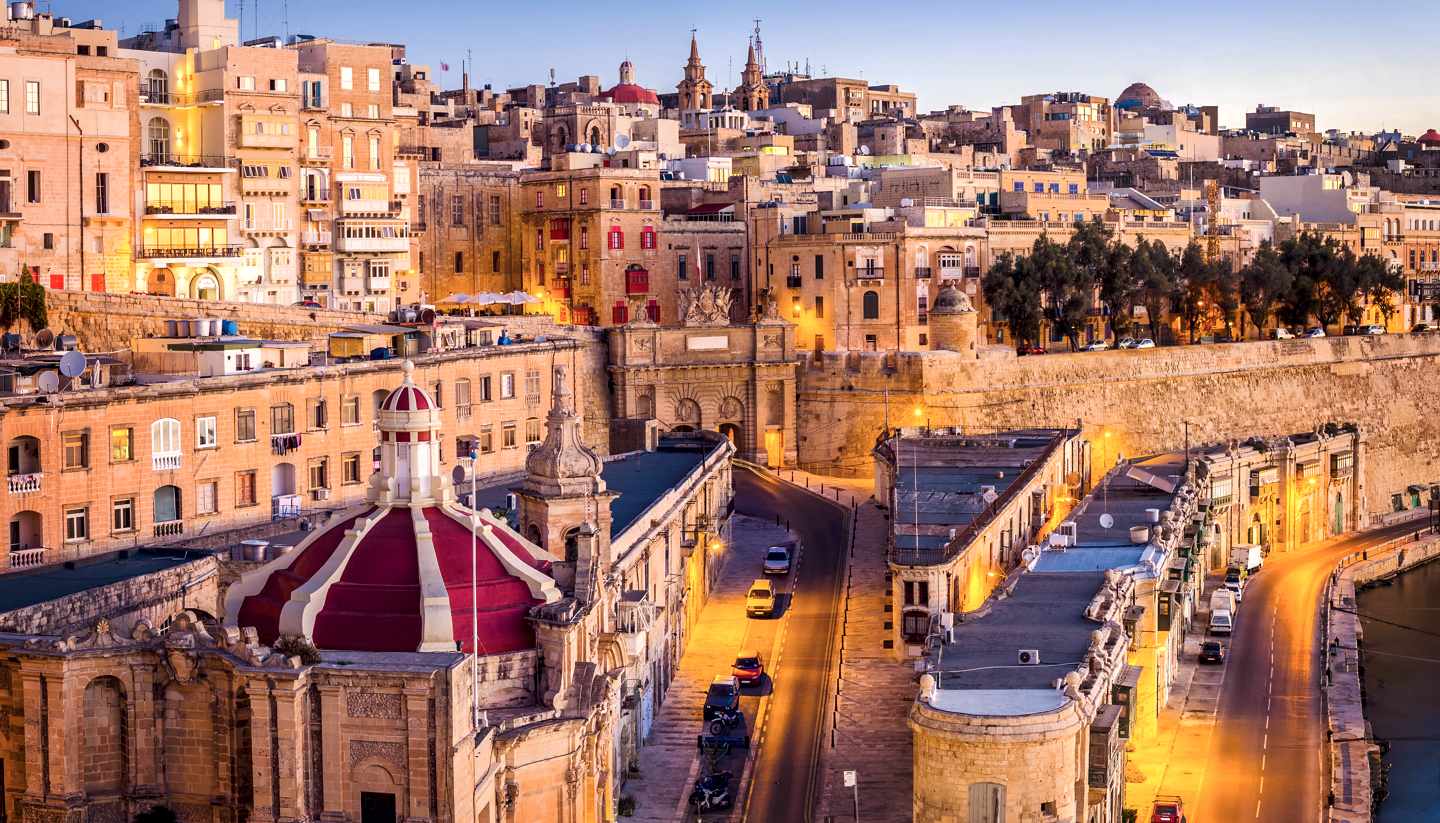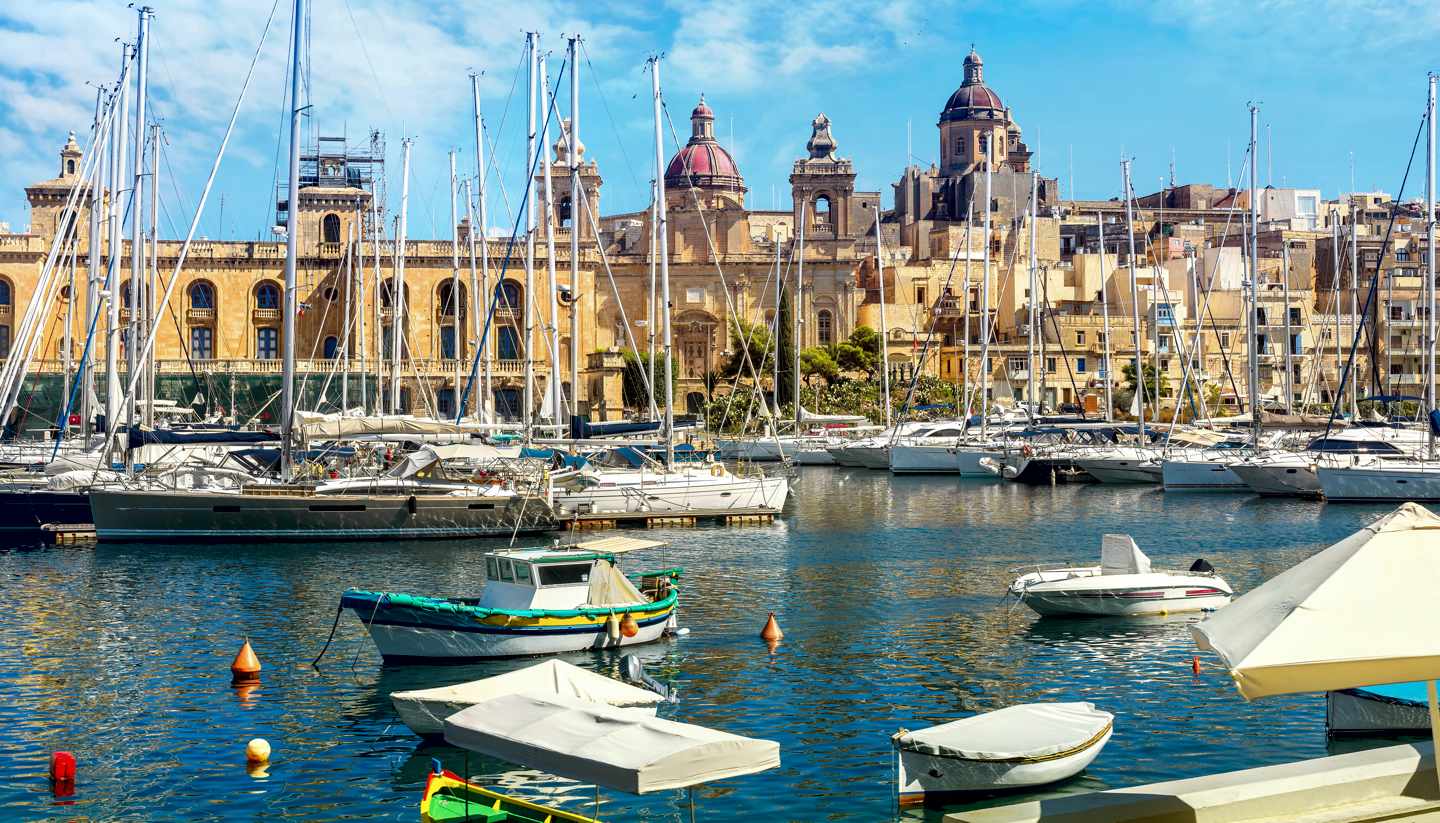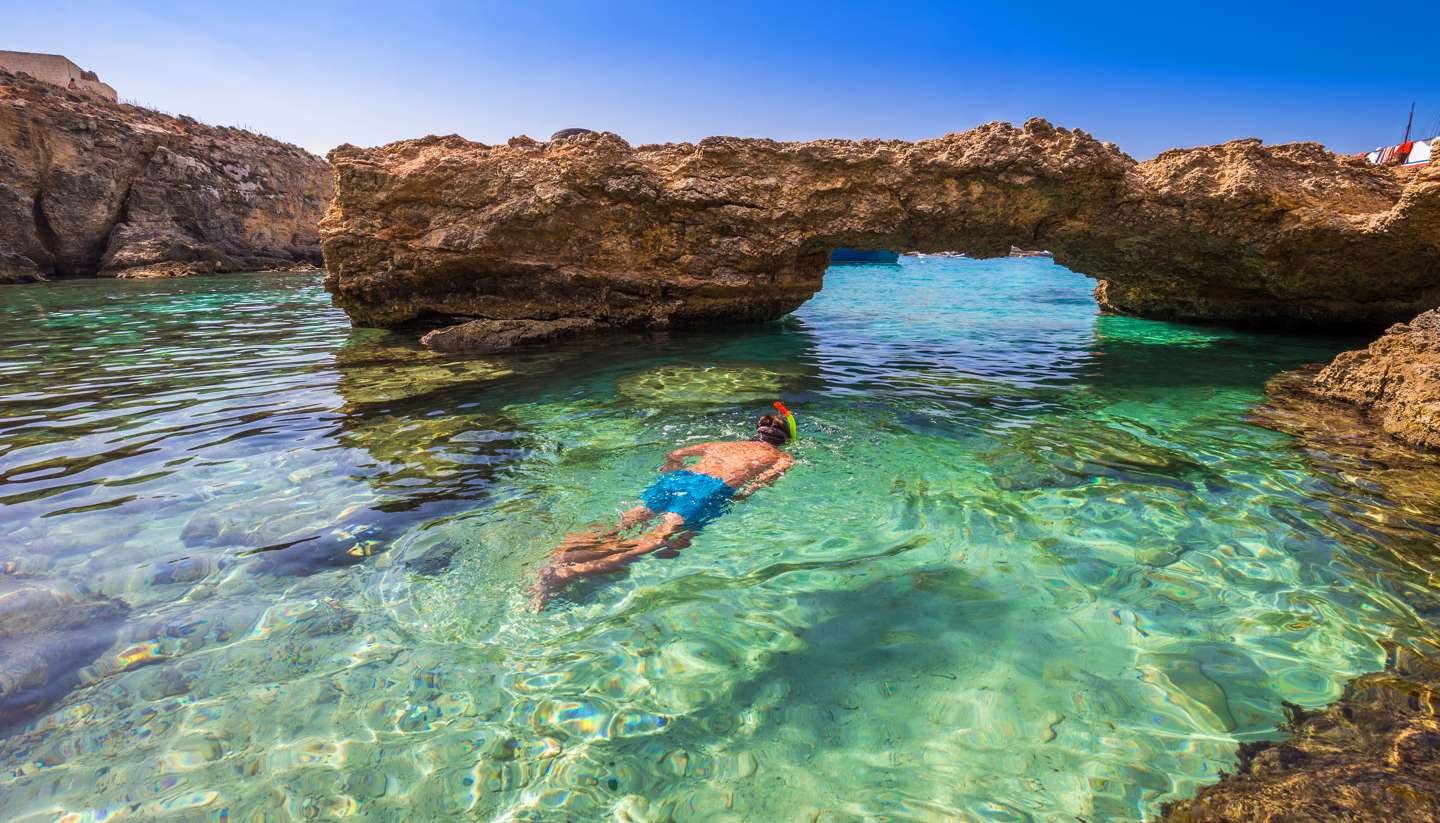Malta travel guide
About Malta
Malta is a relatively small archipelago consisting of three islands (Malta, Gozo and Comino) and other uninhabited islands. It has an area of 316 sq km (122 sq miles), which is roughly the same size as Munich. Although small in size, Malta has bags of character for visitors at every turn – secluded bays, buzzing nightclubs, exhilarating activities and amazing archaeological wonders all await visitors.
Most tourists come for the weather (there are more than 300 days of sunshine annually) and crystalline waters, which make it one of the best beach holiday destinations in Europe. The best beaches in Malta include the secluded Fomm ir-Rih, the popular Mellieha Bay, the red-sandy Ramla Bay (in Gozo), the breath-taking Blue Lagoon (in Comino), to name but a few. All three islands also fantastic diving experiences and top diving sites include The Blue Hole, Ghar Lapsi and Qawra Reef, along with seven conservation areas around wrecks:
• The Um el Faroud in Wied Iż-Żurrieq
• MV Xlendi, Cominoland, Karwela off Xatt l-Aħmar
• Tug St Michael, Tug 10 in Marsaskala
• The Imperial Eagle off Qawra Point
• Rożi, P29 off Ċirkewwa
• Blenheim Bomber off Xrobb l-Għaġin
• Bristol Beaufighter off Exiles Point
For history buffs, Malta's distinctive appeal lies in its extraordinary 7,000 years of history. This small island is situated in the central Mediterranean, making it a strategic base since the earliest days of navigation and attracting settlers to come and flourish. Today, it is easy for visitors to find mysteries from the Neolithic period, as well as historic marks left by the Phoenicians, Carthaginians, Romans, Byzantines, Arabs, The Knights of St John (aka Knights Hospitaller or Order of St John), and more recently the French and British. Because the past is well-preserved and visible today, Malta has been described as one big 'open-air museum'.
Key facts
316 sq km (122 sq miles).
460,297 (UN estimate 2018).
1,354 per sq km.
Valletta.
Republic.
President Myriam Spiteri Debono since 2024.
Prime Minister Robert Abela since 2020.
Travel Advice
Before you travel
No travel can be guaranteed safe. Read all the advice in this guide. You may also find it helpful to:
- see general advice for women travellers
- read our guide on disability and travel abroad
- see general advice for LGBT+ travellers
- read about safety for solo and independent travel
- see advice on volunteering and adventure travel abroad
Travel insurance
If you choose to travel, research your destinations and get appropriate travel insurance. Insurance should cover your itinerary, planned activities and expenses in an emergency.
About FCDO travel advice
The Foreign, Commonwealth & Development Office (FCDO) provides advice about risks of travel to help you make informed decisions. Find out more about FCDO travel advice.
Get travel advice updates
Sign up to get email notifications when this advice is updated.
Follow FCDO:
This information is for people travelling on a full ‘British citizen’ passport from the UK. It is based on the UK government’s understanding of the current rules for the most common types of travel.
The authorities in Malta set and enforce entry rules. If you’re not sure how these requirements apply to you, contact the Maltese High Commission in the UK.
Passport validity requirements
Malta follows Schengen area rules. Your passport must:
- have a ‘date of issue’ less than 10 years before the date you arrive – if you renewed your passport before 1 October 2018, it may have a date of issue that is more than 10 years ago
- have an ‘expiry date’ at least 3 months after the day you plan to leave the Schengen area (the expiry date does not need to be within 10 years of the date of issue)
Check with your travel provider that your passport and other travel documents meet requirements. Renew your passport if you need to.
You will be denied entry if you do not have a valid travel document or try to use a passport that has been reported lost or stolen.
Visa requirements
You can travel without a visa to the Schengen area, which includes Malta, for up to 90 days in any 180-day period. This applies if you travel:
- as a tourist
- to visit family or friends
- to attend business meetings, cultural or sports events
- for short-term studies or training
The requirements for working in Malta are different.
If you are travelling to other Schengen countries as well, make sure your whole visit is within the 90-day limit. Visits to Schengen countries in the previous 180 days before you travel count towards your 90 days. If you overstay the 90-day visa-free limit, you may be banned from entering Schengen countries for up to 3 years.
Make sure you get your passport stamped on entry and exit.
If you’re a visitor, border guards will look at your entry and exit stamps to check you have not overstayed the 90-day visa-free limit for the Schengen area.
If your passport is missing a stamp, show evidence of when and where you entered or left the Schengen area (for example, boarding passes or tickets) and ask the border guards to add the date and location in your passport.
At Maltese border control, you may also need to:
- show a return or onward ticket
- prove that you have enough money for your stay
Staying longer than 90 days in a 180-day period
To stay longer, you must meet the Maltese government’s entry requirements. Check which type of visa or permit you need with the Maltese High Commission in the UK. The Maltese Central Visa Unit also has information.
If you stay in Malta with a residence permit or long-stay visa, this does not count towards your 90-day visa-free limit.
Read about passport stamping if you live in Malta.
New Schengen entry requirements
The EU’s Entry/Exit System (EES) is expected to start in October 2025. It is not currently in operation. The European Union will inform about the specific start date of the EES before its launch.
Read more information on the EU Entry/Exit System.
Vaccine requirements
To enter Malta, you must have a certificate to prove you’ve had a yellow fever vaccination if you’re coming from a country listed as a transmission risk.
For full details about medical entry requirements and recommended vaccinations, see TravelHealthPro’s Malta guide.
Customs rules
There are strict rules about goods that can be brought into and taken out of Malta. You must declare anything that may be prohibited or subject to tax or duty.
Taking food into Malta
You cannot take meat, milk or products containing them into EU countries. There are some exceptions such as powdered baby milk, baby food and special foods or pet feed required for medical reasons.
Taking money into Malta
Declare cash or travellers cheques if the value is 10,000 euros or more. You will get a certified declaration to show you brought it in with you. If you do not, your money could be seized when you leave.
Terrorism
There is a high threat of terrorist attack globally affecting UK interests and British nationals, including from groups and individuals who view the UK and British nationals as targets. Stay aware of your surroundings at all times.
UK Counter Terrorism Policing has information and advice on staying safe abroad and what to do in the event of a terrorist attack. Find out how to reduce your risk from terrorism while abroad.
Terrorism in Malta
Terrorist attacks in Malta cannot be ruled out.
You should be aware of the global risk of indiscriminate terrorist attacks, which could be in public places, including those visited by foreigners.
Crime
Protecting yourself and your belongings
Crime against tourists is rare, but there have been incidents of:
- robbery
- handbag snatching
- pickpocketing
- theft from parked cars
To reduce your risk:
- be cautious when exchanging money and using ATMs
- avoid carrying large amounts of cash if possible
- do not keep all your valuables in one place
- keep a copy of your passport somewhere safe
Pickpocketing has happened on bus routes between Valletta and St Julian’s. Thieves target crowded buses during the summer season. Always keep sight of valuables.
Drink and food spiking
Criminals have drugged people in some bars and gentlemen’s clubs in the Paceville district. They’ve forced them to spend large amounts of money or assaulted them. You should:
- be careful who you buy drinks from
- keep drinks in sight to make sure they are not spiked
- check your bill to make sure you are not being overcharged
Assault
There have been assaults, including rape and sexual assault. Avoid splitting up from your friends and do not go off with people you do not know. If you drink, take sensible precautions including buying your own drinks and always keeping sight of them.
Scams
Scams targeting British nationals are increasing. These come in many forms (romance and friendship, business ventures, work and employment opportunities) and can pose financial risk to victims.
Be cautious about any requests for money, a job offer, a business venture or a face-to-face meeting from someone you met over the internet.
For more information, see guidance from ActionFraud.
Laws and cultural differences
Bird hunting seasons
Bird hunting takes place in the spring and autumn. The Maltese government decides the dates at the start of each season. See local print and online media for the dates and times when hunting is allowed.
Hunting with firearms is common. It is normally allowed from 2 hours before sunrise until 2 hours after sunset. Hunting areas are rarely marked and can overlap with camping areas, country walkways and other public areas. Although not common, there have been incidents between members of the public and locals. Be aware of your surroundings when visiting rural areas and nature spots during the hunting seasons.
Illegal drugs
Illegal drugs, including cannabis, carry severe penalties for tourists.
Malta legalised the cultivation and personal use of cannabis at home in 2021, but smoking in public is illegal and attracts a fine. Possession of up to 7g of cannabis in public for personal use at home is legal for Maltese residents only.
You should expect a long jail sentence and heavy fines for possessing, using or smuggling illegal drugs, including when transiting through the airport. Schengen bans (of up to 5 years) may also be issued alongside fines or after release from detention.
The airport in Malta has excellent technology and security for detecting illegal items. This is also used to scan the baggage of transiting passengers.
Outdoor activities and adventure tourism
Swimming safety
During the summer, lifeguards patrol most beaches and use a flag safety system. Make sure you understand the system and follow any warnings. Red flags indicate dangerous or hazardous conditions. Swim within designated zones and take extra care if there are no lifeguards, flags or signs.
Follow local advice if there are jellyfish.
See:
- water safety on holiday from the Royal Life Saving Society
- watersports safety advice from the Royal Society for the Prevention of Accidents
- the code of conduct for beaches from the Malta Tourism Authority
Transport risks
Road travel
If you are planning to drive in Malta, see information on driving abroad and check the rules of the road in the RAC’s Malta guide. The guide lists driving regulations and other legal requirements you need to be aware of.
You can use a UK photocard driving licence to drive in Malta. If you still have a paper driving licence, you may need to update it to a photocard licence or get the correct version of the international driving permit (IDP) as well.
There is also guidance on driving if you’re living in Malta.
Check if you need a UK sticker to drive your car outside the UK.
You can use your Blue Badge in Malta.
Take care while driving as some roads are in poor condition. Keep to the speed limit. Local standards of driving are poor.
Before you travel check that:
- your destination can provide the healthcare you may need
- you have appropriate travel insurance for local treatment or unexpected medical evacuation
This is particularly important if you have a health condition or are pregnant.
Emergency medical number
Dial 112 and ask for an ambulance.
Contact your insurance or medical assistance company quickly if you’re referred to a medical facility for treatment.
Vaccine recommendations and health risks
At least 8 weeks before your trip:
- check the latest vaccine recommendations for Malta
- see where to get vaccines and whether you have to pay on the NHS travel vaccinations page
See what health risks you’ll face in Malta.
Medication
The legal status and regulation of some medicines prescribed or bought in the UK can be different in other countries.
UK prescriptions are not recognised in Malta. If you need medication while travelling, speak to a Maltese medical practitioner. A Maltese pharmacist can issue prescriptions from EU member states if they can confirm the prescriber is licensed.
Medication in Malta might not match UK or EU makes and brands. Check your prescription has a suitable local equivalent with a pharmacist or doctor. A Maltese medical practitioner may need to assess you and issue a local prescription.
Read best practice when travelling with medicines on TravelHealthPro.
Healthcare in Malta
FCDO has a list of medical providers in Malta.
You can request to see a private GP at most pharmacies.
Health insurance cards
To get medically necessary state healthcare in Malta, you need a Global Health Insurance Card (GHIC) or a European Health Insurance Card (EHIC).
The NHS’s getting healthcare abroad webpage has details about:
- how to apply for a GHIC
- how to get temporary cover if you lose your card or it does not arrive in time
- who qualifies for a new EHIC instead of a GHIC
- what treatment counts as medically necessary
A GHIC or EHIC is not an alternative to travel insurance. You may have costs your GHIC or EHIC does not cover, including:
- changes to travel and accommodation bookings
- additional standard costs for treatment
- medical repatriation to the UK
- treatment that is ruled non-urgent
- private healthcare
- private clinics
There is also guidance on healthcare if you’re living in Malta.
Travel and mental health
Read FCDO guidance on travel and mental health. There is also mental health guidance on TravelHealthPro.
The Foreign, Commonwealth & Development Office (FCDO) cannot provide tailored advice for individual trips. Read this travel advice and carry out your own research before deciding whether to travel.
Emergency services in Malta
Telephone: 112 (ambulance, fire, police)
Contact your travel provider and insurer
Contact your travel provider and your insurer if you are involved in a serious incident or emergency abroad. They will tell you if they can help and what you need to do.
Refunds and changes to travel
For refunds or changes to travel, contact your travel provider. You may also be able to make a claim through insurance. However, insurers usually require you to talk to your travel provider first.
Find out more about changing or cancelling travel plans, including:
- where to get advice if you are in a dispute with a provider
- how to access previous versions of travel advice to support a claim
Support from FCDO
FCDO has guidance on staying safe and what to do if you need help or support abroad, including:
- finding lawyers and funeral directors in Malta
- dealing with a death in Malta
- being arrested in Malta
- getting help if you’re a victim of crime
- what to do if you’re in hospital
- if you’re affected by a crisis, such as a terrorist attack
Contacting FCDO
Help abroad
See how to get help from the UK government abroad including in an emergency.
Help in the UK
You can call FCDO in London if you need urgent help because something has happened to a friend or relative abroad.
Telephone: 020 7008 5000 (24 hours)
Get travel advice updates
Sign up to get email notifications when this travel advice is updated.
Follow FCDO:





